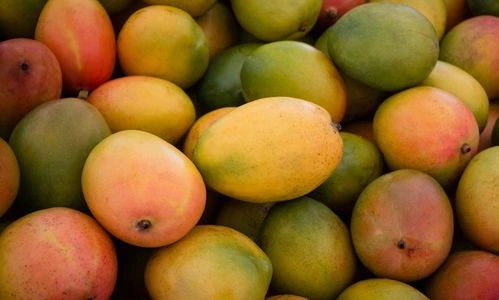The mango is often called the king of fruits. It holds a special place in Indian culture and cuisine. The mango is a tropical fruit and it is known for its juicy taste, vibrant color and delicious flavor. Mangoes are native to South Asia, especially to India. Mango has been in cultivation in India for thousands of years. Mango is also rich in fibre and is loaded with many vitamins and minerals. The large production capacity of mangoes in India is beneficial for its economic development.

1. Uttar Pradesh
Uttar Pradesh remains the largest mango-producing state in India. It contributes to 23% of mango production in India. The state produces a variety of mangoes that cater to different tastes and preferences across the country. Alphonso also called King of Mangoes is highly produced in UP. It is one of the most popular and highly prized mango varieties in India. Apart from this Uttar Pradesh cultivates Dasheri, Langra, and Chausa mango varieties. The regions in Uttar Pradesh that produce mangoes are Malihabad, Saharanpur, and Meerut. Malihabad. The farmers in Uttar Pradesh employ traditional orchard management techniques along with modern practices. Integrated pest management and organic farming are a few methods adopted by mango farmers of UP. The government also takes initiatives to support mango growers, including training programs and subsidies.
2. Andhra Pradesh
The second largest producer of mangoes in India is Andhra Pradesh. Andhra Pradesh is blessed with a perfect climate for the cultivation of mangoes. The state contributes to nearly 18% of mango production in India. The state cultivates a wide range of mango varieties including Kesar. A few other varieties of mango grown in the state are Banganapalli (also known as Benishan) and Suvarnarekha. Banganapalli mangoes, with their smooth, fiberless pulp and sweet taste, have a large market both domestically and internationally. The key mango-growing regions in Andhra Pradesh include Chittoor, Krishna, and Kurnool. These regions benefit from well-distributed rainfall and a warm climate, which are ideal for mango cultivation. Farmers in Andhra Pradesh have adopted modern techniques such as drip irrigation, high-density planting, and organic farming to boost productivity.
3. Karnataka
Karnataka is another leading mango-producing state, known for its diverse agro-climatic conditions that support the cultivation of a variety of mangoes. The state has a strong presence in both domestic and export markets. Karnataka is famous for varieties like Alphonso (Hapus), Raspuri, and Totapuri. Important mango-growing regions in Karnataka include Ramanagara, Kolar, and Dharwad. Ramanagara, the “Mango City,” is known for its extensive mango orchards and high-quality produce. Karnataka’s farmers utilize advanced cultivation practices like grafting, pruning, and pest management to improve yield and fruit quality.
4. Bihar
Bihar has emerged as a prominent mango-producing state in recent years. The state’s climate and fertile soil make it suitable for the cultivation of high-quality mangoes. The Malda variety of mango, which is celebrated for its sweetness and distinct flavor, is grown in Bihar. Major mango-producing areas in Bihar include Bhagalpur, Muzaffarpur, and Darbhanga. Mango farmers of Bihar employ traditional horticultural practices alongside modern methods like high-density planting and organic farming. State government initiatives focusing on horticulture development have played a key role in enhancing mango production in the region.
5. Gujarat
The last state on our list that is the highest producer of mango is Gujarat. The hot and dry state of Gujarat is well-suited for cultivating mango varieties like Kesar and Kesari. Gujarat contributes to 9.5% of mango production in the country. Yet another variety of mango that is widely grown in Gujarat is Totapuri. This variety of mango is famous for its sweet and tangy flavor. It is widely used in the making of pickles and juices. The mango farmers in Gujarat employ advanced farming techniques, including drip irrigation and mulching. These techniques of farmers have enhanced mango production in the state.
In conclusion
Mango is a popular fruit in India. The diverse agro-climate conditions of India are ideal for the cultivation of mangoes in the country. The large production of mangoes in India meets the demands of global and international requirements. India is home to multiple varieties of mangoes. Mangoes produced in India are also widely used in producing other food products like pickles, juices and pulp extraction.
Parkash Singh is a PGT Teacher in Kendriya Vidyalaya Rohini, New Delhi. Parkash completed his starting education from Bihar Board and graduated from Babasaheb Bhimrao Ambedkar Bihar University. He regularly writes educational and informative articles at IndiasStuffs.com
Page Contents

